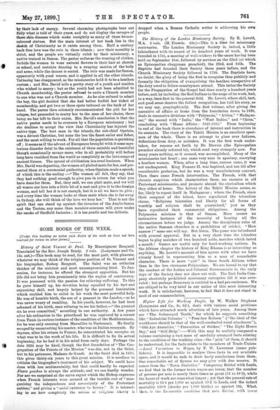The History of the London Missionary Society. By R. Lovett,
MA. 2 vols. (H. Frowde. 42s.)—This is a time for missionary centenaries. The London Missionary Society is, indeed, a little behindhand with its record of its hundred years of work. It was founded in 1795, a meeting of well-wishers to the cause having been held on September 21st, followed by services on the 22nd (at which an Episcopalian clergyman preached), the 23rd, and 24th. The Baptists had founded their Society three years before, and the Church Missionary Society followed in 1799. The Baptists have, no doubt, the glory of being the first to recognise thus publicly and formally the obligation of evangelising the heathen irrespective of the duty owed to fellow-countrymen abroad. This latter the Society for the Propagation of the Gospel had done nearly a hundred years before, and, by including the Red Indians in the scope of its work, had, in away, been first in the general field. Mr. Lovett, whose skill, tact, and good sense deserve the fullest recognition, has told his story, as we may say, geographically. The first volume, after giving the narrative of affairs at home from the foundation down to 1820, deals in successive divisions with "Polynesia," " Africa," "Madagas- car," the second with "India," the "West Indies," and "China," concluding with "Home Affairs : 1821-1895." From beginning to end of the book there is abundance of interest and instruction in its contents. The story of the Tahiti Mission is an excellent speci- men of the whole. There is no attempt to gloss over failures, deflections from duty, or mistakes. It was the first work under- taken, for reasons set forth by Dr. Haweis (the Episcopalian preacher already referred to), which read very strangely now. For many years nothing, as it seemed, was accomplished. Many of the missionaries lost heart ; one came very near to apostasy, marrying a heathen woman. When, after a long time, success came, it was not unchequered. King Pomare IL was baptised, and not till after considerable probation, but he was a very unsatisfactory convert. Then there came French intervention. The French, with that chronic suspicion which characterises them, see enemies in all Protestant missionaries, and promote abroad the clericalism which they abhor at home. The history of the Tahiti Mission seems, so far, likely to repeat itself in Madagascar ; where the French, since their conquest of the island, have repudiated the toleration clause, "Religious toleration and liberty for all forms of worship and religion shall be guaranteed," just as they have repudiated their commercial obligations. Among the Polynesian missions is that of Samoa. Here occurs an instructive instance of the necessity of hearing all the circumstances before we judge. Among the disciplinary rules of the native Samoan churches is a prohibition of cricket. "How narrow I" some one will say. But listen. The game was introduced with general approval. But in a very short time the islanders began to play matches of two hundred aside, matches which lasted a month I Games are useful only for hard-working nations. In the African chapter the history of King Khama is as interesting as anything. Mr. Lovett's account of him agrees with what we have already heard in representing him as a man of remarkable character. There is more "grit" in these South African tribes than in the less strenuous Polynesians. We are bound to say that the conduct of the Indian and Colonial Governments in the early days of the Society does not show out well. The East India Com- pany absolutely prohibited missionary enterprise till it was over- ruled ; but perhaps Demerara is entitled to a bad pre-eminence. We are obliged to be very brief in our notice of this most interesting work. It is satisfactory, however, to feel that it does not stand in need of our commendation.






































 Previous page
Previous page